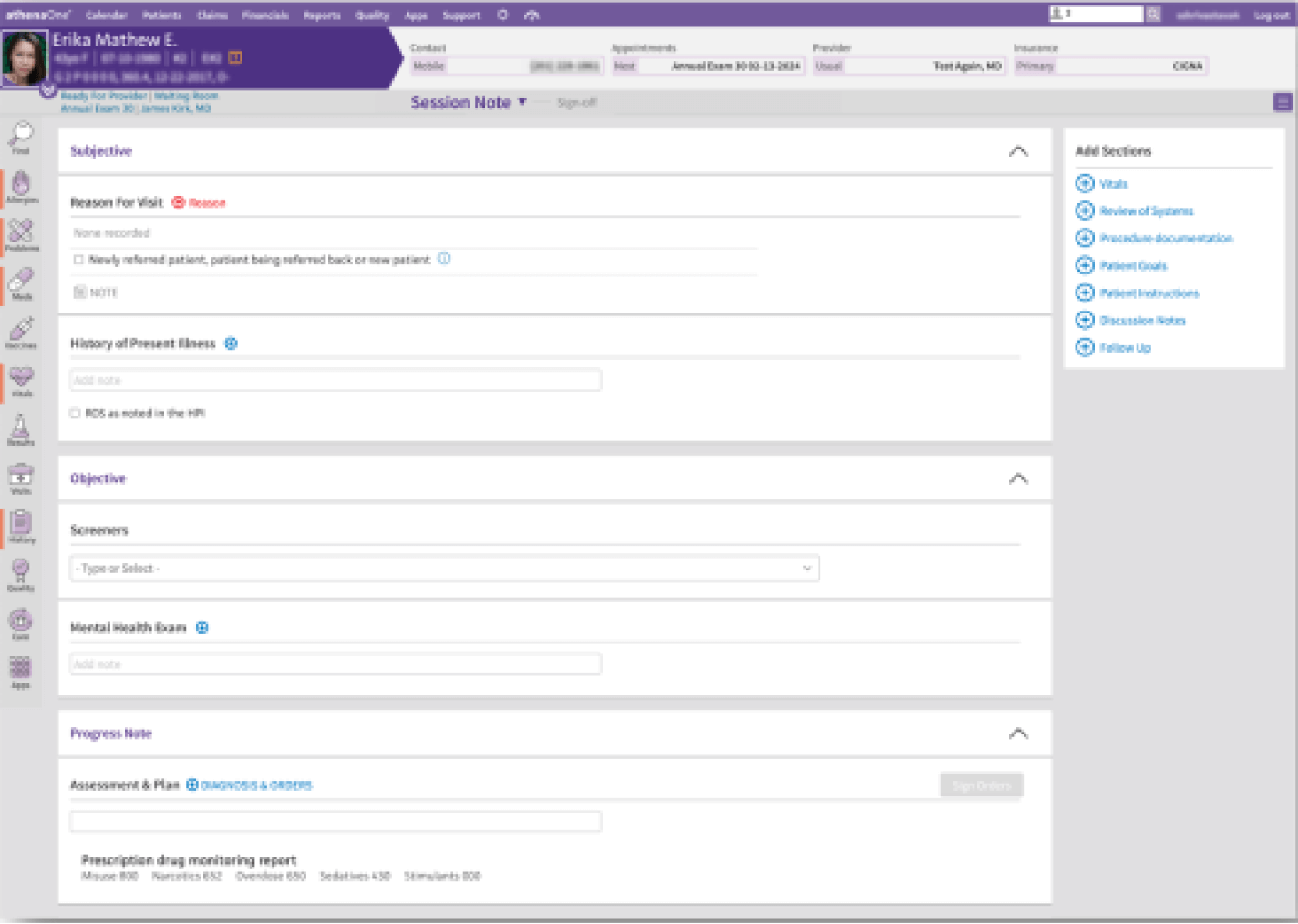Create stronger connections with athenaOne for Behavioral Health


Behavioral health is a fast-growing specialty within the U.S. healthcare industry and has expanded even more in the years following the COVID-19 pandemic. In fact, the U.S. behavioral health market is estimated to reach $136 billion by 2032.1 But what are the driving forces behind this significant growth?
The healthcare industry is shifting towards prioritizing the broader mental health crisis in America, which includes a lack of access to care - healthcare providers, policy makers, celebrities, and more are tipping the scale for increased education and awareness of behavioral health disorders and serious mental illnesses (SMIs). In this effort to expand access to behavioral health care, we’re also seeing the rise of telehealth as a way for providers to care for more patients and enhance access to care.
Until recently, behavioral health providers have been left behind when it comes to technology that supports their practices and patients. The term “behavioral health” covers a wide range of provider types and service offerings, including psychiatrists, clinical psychologists, therapists, and addiction specialists to intensive outpatient and partial hospitalization (IOP/PHP), group therapy, and more. In behavioral health, the right connections are a powerful catalyst for better outcomes and behavioral health practices need an EHR system and comprehensive solution that isn’t “one size fits all”. We understand that behavioral health is a critical piece of the larger puzzle that makes up holistic and comprehensive patient care.
Let’s take a look at some of the main challenges that behavioral health providers face today.
Top challenges for behavioral health practices today
1. Low reimbursement rates: Behavioral health services receive lower reimbursement rates compared to medical services, causing significant financial strain especially for smaller practices. This pressure is also compounded by the limited number of patients that can be seen per day.
2. High administrative burden and burnout: Documentation burden and lack of resources (both financial and employee) are also common issues, leading to excessive administrative burden and provider burnout. Behavioral health providers face a disconnect between desired and required documentation, compounded by high patient demand, acuity, and low provider availability.
3. Rising patient needs: More and more patients today require mental health services, but very few have adequate insurance coverage or can find a provider close to them. In fact, one in four adults who did not get mental health care say the main reason was because they could not find a provider (24%) or could not afford the cost (23%).2
4. Caring for patients across the care continuum: Behavioral health providers manage patients across many different care settings, like outpatient, IOP/PHP, and inpatient. This puts stress on the need for interoperability and improved care coordination. If HIT tools and EHR systems can’t communicate effectively, providers will be left in the dark about patient needs.
5. Keeping up with increasing regulations: Complex reporting requirements and interoperability standards are some examples of how providers today are struggling to stay on top of requirements and regulations. Many behavioral health providers today find it hard to stay in the loop when regulations shift and change.
The solution: finding a behavioral health EHR that helps providers thrive
These five challenges are making it increasingly difficult for behavioral health providers to thrive and grow while continuing to provide high quality care to patients. So, what are some ways that behavioral health providers can combat these challenges using the right EHR software or HIT solution?
- Reduce administrative burden – By using an EHR system or HIT solution that’s tailored to behavioral health, providers can help reduce administrative burden without needing to hire more resources. Providers should look for a behavioral health EHR that empowers you with tailored, intuitive clinical workflows and valuable training support.
- Expand access to patients - Providers should look for a solution that offers telehealth capabilities. By leaning into telehealth, behavioral health providers can care for more patients and gain more flexibility in their work schedule.
- Streamline reimbursement – To address low reimbursement rates, providers need an HIT solution that can help take on administrative work, create revenue cycle efficiencies, make patient payments quick and easy, and simplify medical billing.
With a comprehensive HIT solution, one that’s ASTP/ONC HIT-certified and unique to behavioral health providers, your practice can help address and solve these common industry challenges. athenaOne ® for Behavioral Health works to help providers expand access to care, reduce burnout, capture reimbursement, create better connections across the care continuum, and more. Let’s take a closer look at these key benefits.
Top benefits of athenaOne for Behavioral Health
We understand the complexities and challenges of running a behavioral health practice, inspiring our goal to help providers gain more focused time back with patients. Practices using athenaOne for Behavioral Health gain access to all the benefits of athenaOne, athenahealth’s comprehensive, cloud-based practice management solution that delivers EHR software, as well as revenue cycle management and patient engagement software. This includes the dynamic athenaOne platform, a single-instance SaaS environment that helps enable scalable solutions, seamless data exchange, and full clinical visibility across all the places their patients receive care.
With athenaOne for Behavioral Health, practices can collaborate with, and gain valuable insights from, over 150K providers—including over 12K behavioral health providers—on the athenahealth network.3 Knowing how critical it is to connect behavioral health practices to other care providers across the continuum, athenaOne for Behavioral Health is also designed with interoperability in mind.
Key benefits of athenaOne for Behavioral Health:
- Tailored behavioral health documentation to help reduce admin burden and burnout
- Behavioral health specific treatment plans, group therapy, and IOP/PHP support
- Streamlined billing, coding, and revenue cycle management to help increase reimbursement rates
- Drive access to care and help increase patient engagement with athenaTelehealth
Let’s take a closer look at some of the behavioral health-specific features of athenaOne for Behavioral Health that can help empower providers.

Providers get specialty-focused tools and features using athenaOne for Behavioral Health
1. Behavioral health-specific clinical documentation and visit layout
- Patient encounter layout follows the Subjective Objective Progress Note format, with treatment plans directly integrated into the encounter.
- A growing set of behavioral health screeners are also available, including CFARS, HAM-A, HAM-D, and more.
2. Use athenaTelehealth to stay in touch with patients* -
- The convenience of getting care at home is perfect for behavioral health patients who are unable to see clinicians in-person, and those who are managing ongoing mental health conditions. By offering telehealth visits as an option, your practice can both acquire new patients and increase patient satisfaction.
- athenaTelehealth is fully integrated with athenaOne and helps you support vital patient care and help maintain your practice’s schedule density with HIPAA-compliant telehealth visits.
*Note: athenaTelehealth is an add-on service to athenaOne
3. Group therapy support -
- athenaOne for Behavioral Health provides full support for group therapy sessions.
- This includes scheduling, robust and easy clinical documentation for patient encounters, individual notes, and full medical billing support.
4. Intensive outpatient and partial hospitalization support (IOP/PHP) -
- Medical billing support for higher acuity behavioral health care like IOP/PHP, where recurring and linked appointments are placed on a single claim.
5. Behavioral-health specific customer enablement -
- Unlimited one-on-one behavioral health training support with a coach as well as behavioral health focused online learning tools
- A dedicated resource page on the Success Community focused on workflows and best practice recommendations
- Dedicated Customer Success Managers (CSMs) that help to provide personalized support and guidance to ensure the success of your practice.
- This includes tracking key performance indicators (KPIs) and identifying opportunities for improvement.
- Behavioral health-specific onboarding team that will work with you and your team to gather critical information about your business to ensure a successful go-live.
By leveraging the power of connections, behavioral health practices can enhance care delivery, improve access, reduce complexity, and enable more holistic care. athenaOne for Behavioral Health is a solution that addresses the unique challenges faced by behavioral health providers and ensures behavioral health plays its essential role in whole health. If your behavioral health practice is looking for a comprehensive solution that supports your core mission of delivering the most holistic, meaningful care to patients, then read more about athenaOne for Behavioral Health.
- U.S. Behavioral Health Market Size Envisioned at USD 136.6 Billion by 2032., 2022, https://www.towardshealthcare.com/insights/us-behavioral-health-market
- Kaiser Family Foundation, “Mental Health Impact of COVID-19 Pandemic: An Update”, April 2021, https://www.kff.org/coronavirus-covid-19/poll-finding/mental-health-impact-of-the-covid-19-pandemic/
- Based on athenahealth data as of Dec. 2023; Based on athenahealth data as of Jun. 2024; includes Behavioral Health, Psychology, Psychiatry, and Addiction Medicine providers; M108











